Climate Action Roadmap Showcase | Tackling carbon emissions in the supply chain | Reducing emissions in transport and logistics | Driving towards net zero properties | Changing consumer behaviour
Reducing waste
Waste can come in many forms, from lost material in the manufacturing process, food which has expired, or unnecessary packaging that ends up in landfill. Reducing such wate not only can lower carbon emissions, but save money in operations and reduce landfill. This category is about cutting that waste – food or non-food - produced through retailer operations. For example, moving to more recyclable / compostable materials, removing single-use materials from products and packaging, or making productive use of waste such as food waste for fuel / compost.
Bravissimo – Donating discontinued clothing line
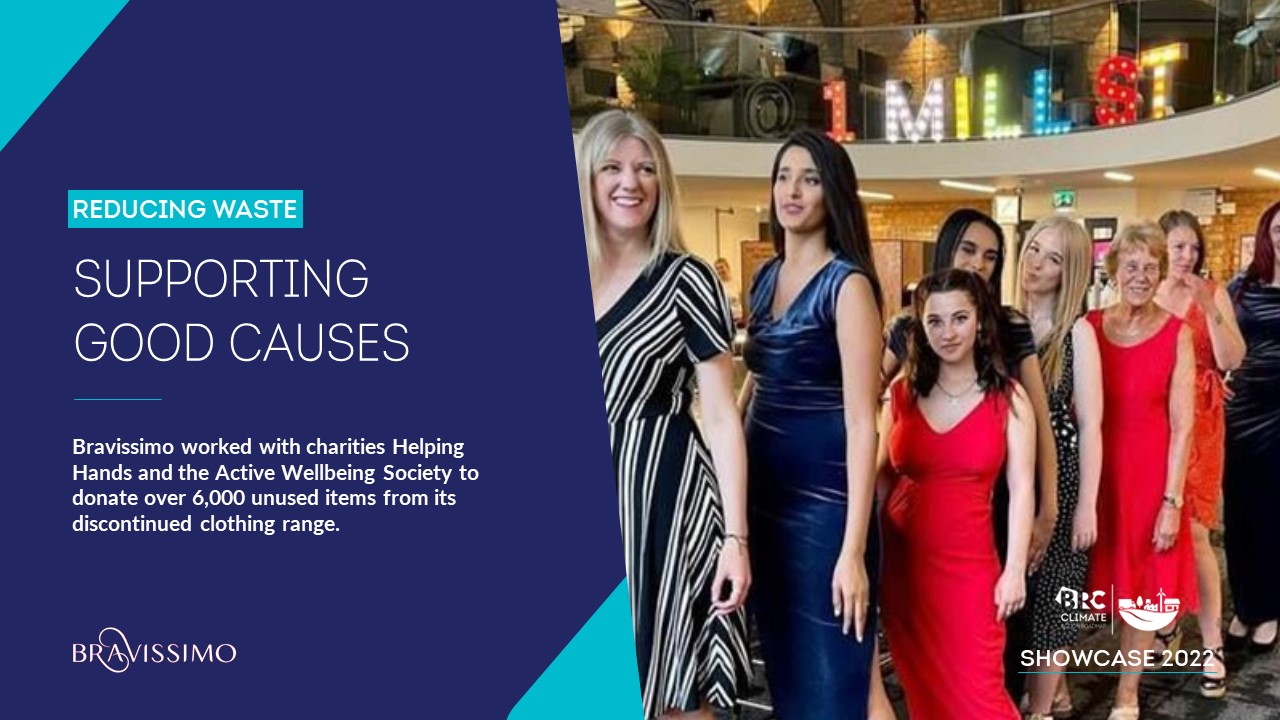
LEARN MORE
In 2021 Bravissimo made the difficult decision to discontinue our clothing range, stopping production of new styles and winding down our stock holding over the course of the year. While communicating with our customers and making sure the Clothing Exit was a positive experience for them was our top priority, we were also deeply aware that exiting a range would lead to the production of waste garments. Therefore, we set ourselves the ambitious target of ensuring that no leftover clothing or supporting stocks (such as hangers and sizing markers) went to landfill.
After setting this target, we focussed on how we could find productive and positive uses for our stock so we reached out to local charities and organisations to establish how donating clothing could support their work. We connected with two charities – Helping Hands and the Active Wellbeing Society and arranged to donate nearly 6,000 units of our clothing ranging from feel-good formal dresses to everyday essential padded jackets. Furthermore, we diligently quantified redundant supporting stock and researched potential sustainable disposal methods to ensure that every potential source of waste was accounted for.
In early 2022 we stopped selling our clothing range, while this marked the end of an era for Bravissimo it also allowed us to get started on the donations and create some meaningful change. Our Warehouse team got stuck into picking and packing thousands of garments, separating the stock by each charity’s needs. In March 2022, we donated the clothing, and the stock has been used to support their valuable work ever since!
Of course, to achieve our target of zero stock to landfill we had to leave no stone unturned. Bravissimo connected with providers who could repurpose our hangers, pelletise our plastic ‘pips’ and recycle leftover garments that came back to us via customer returns.
Dunelm – Textile Takeback Scheme
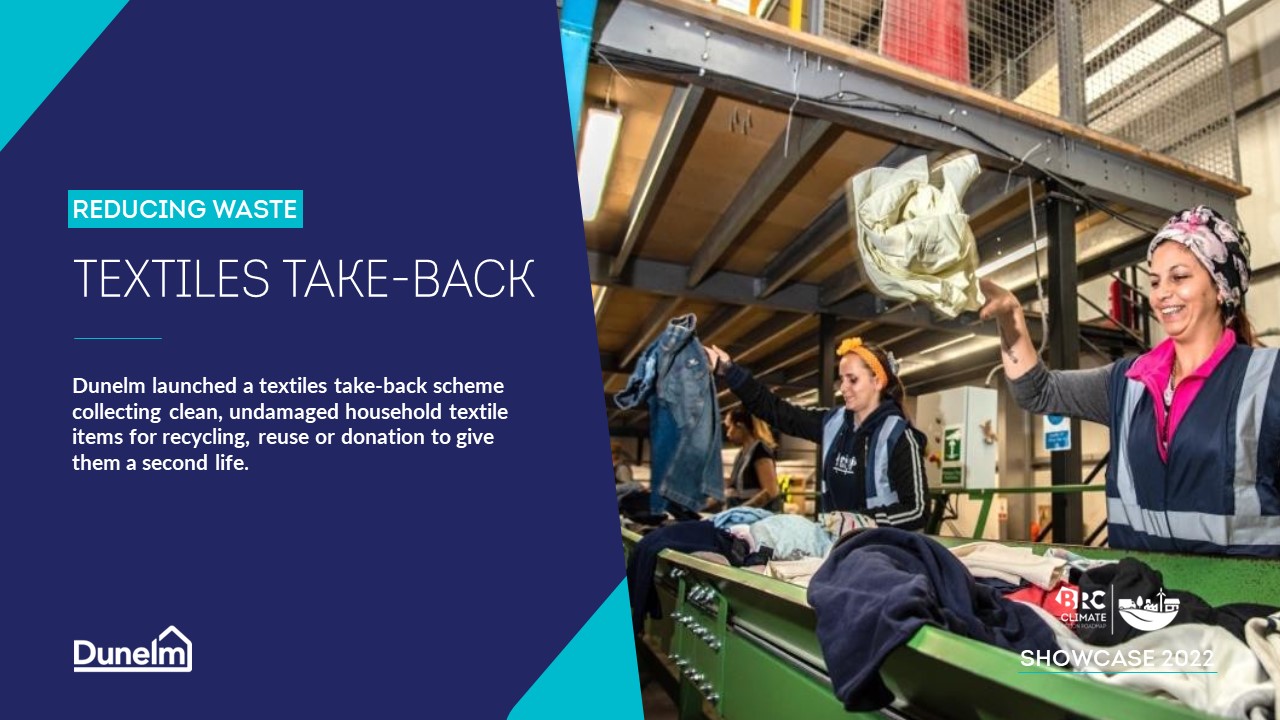
LEARN MORE
Dunelm are the UK’s leading homewares retailer with a growing presence in the furniture market, with over 175 stores in the UK. ‘Sustainable in everything we do’ is one of our foundations and highlights the importance we place on building sustainability into every aspect of our business. We are committed to products, services and experiences that are: better for the planet, better for the home and better for people.
Global textiles production and consumption has continued to rise, with a ‘take, make and dispose’ model which has severe impacts on the environment. The textile industry is also very resource intensive with a historical unsustainable use of water, land, energy as well as using toxic chemicals in the manufacturing process. With consumption of household-type textiles at an estimated 295,000 tonnes and around 391,000 tonnes (Wrap, 2022) of non-clothing textiles in UK residual waste, the need to transition to a more circular economy has never been so urgent.
To help reduce textile waste, Dunelm introduced its Textile Take Back Scheme where we are collecting clean and undamaged home textiles to give them a second life. Available at most of our stores, items can be dropped off where they will then be re-used, donated or recycled to promote a circular economy. Launching in September 2021, the scheme saw a successful launch, exceeding internal expectations and targets.
Greggs – Reducing waste from manufacture to store
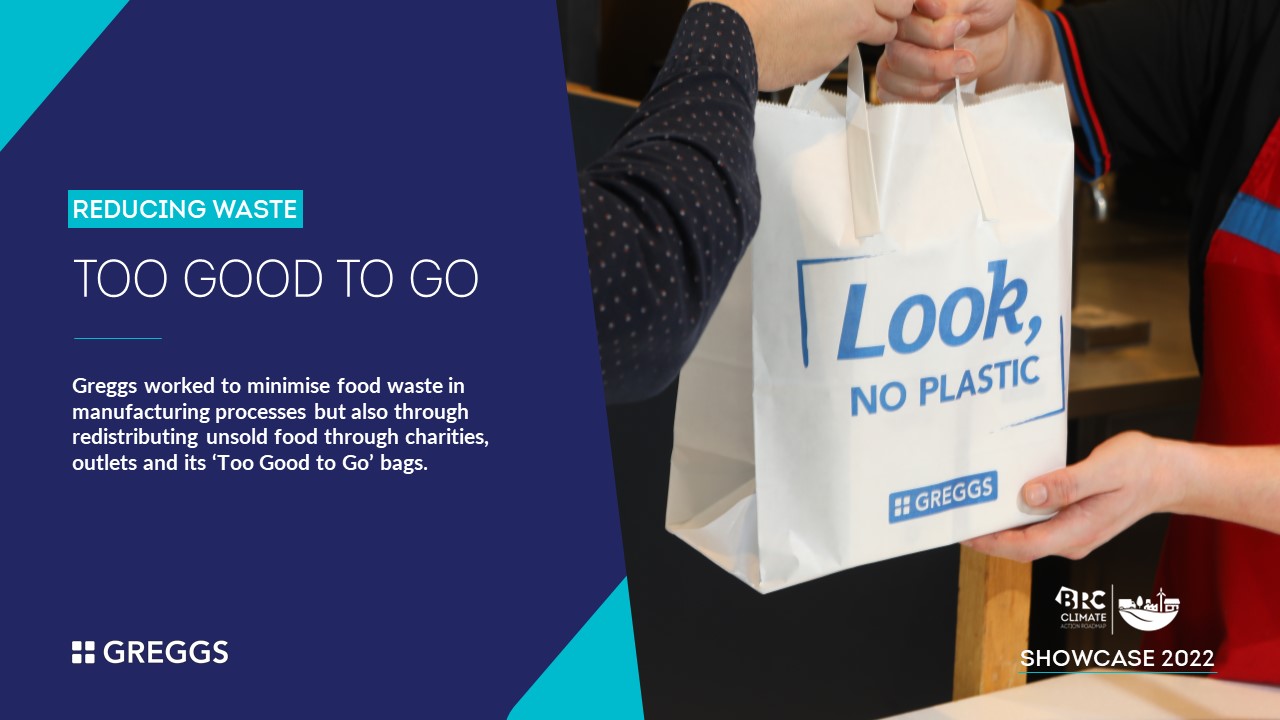
LEARN MORE
Food waste is an industry wide issue and Greggs are committed to tackling this throughout all aspects of our business. We have chosen food waste as a primary focus at the centre of our Greggs Pledge, released in 2020, with the aim to create 25% less food waste than in 2018 and will continue to work towards 100% surplus food going to those most in need.
We identified our waste streams and created a waste hierarchy to help us reach our 100% ambition. The hierarchy is underpinned by a desire to limit waste at source in our manufacturing and retail functions and then includes:
Within our internal activities, we use highly efficient mapping processes that has enabled us to spot where waste is being created so we can make targeted changes within our production processes. Whilst we work hard to improve our processes, we know there will always be some waste, in this case we need to continue to do all we can to keep it out of landfill. Therefore, our Manchester, North Lakes and Leeds sites send food waste to be used as animal feed with more sites to follow in 2022. We have worked with our Retail teams to manage stock levels and donate any surplus food waste to those in need through our charity partners, sell at a discounted price in our Outlet shops and through Too Good to Go.
In 2021, we donated over 1,000 tonnes of food to our charity partners, redistributed 28% of all unsold food in our shops and reduced manufacturing waste by 31% (as a % of sales). By the end of 2022, we will have reduced the amount of food waste we create in our manufacturing operations by 10% and increased food redistribution by a further 10%.
Harvey Nichols – Reducing food waste at the OXO Tower
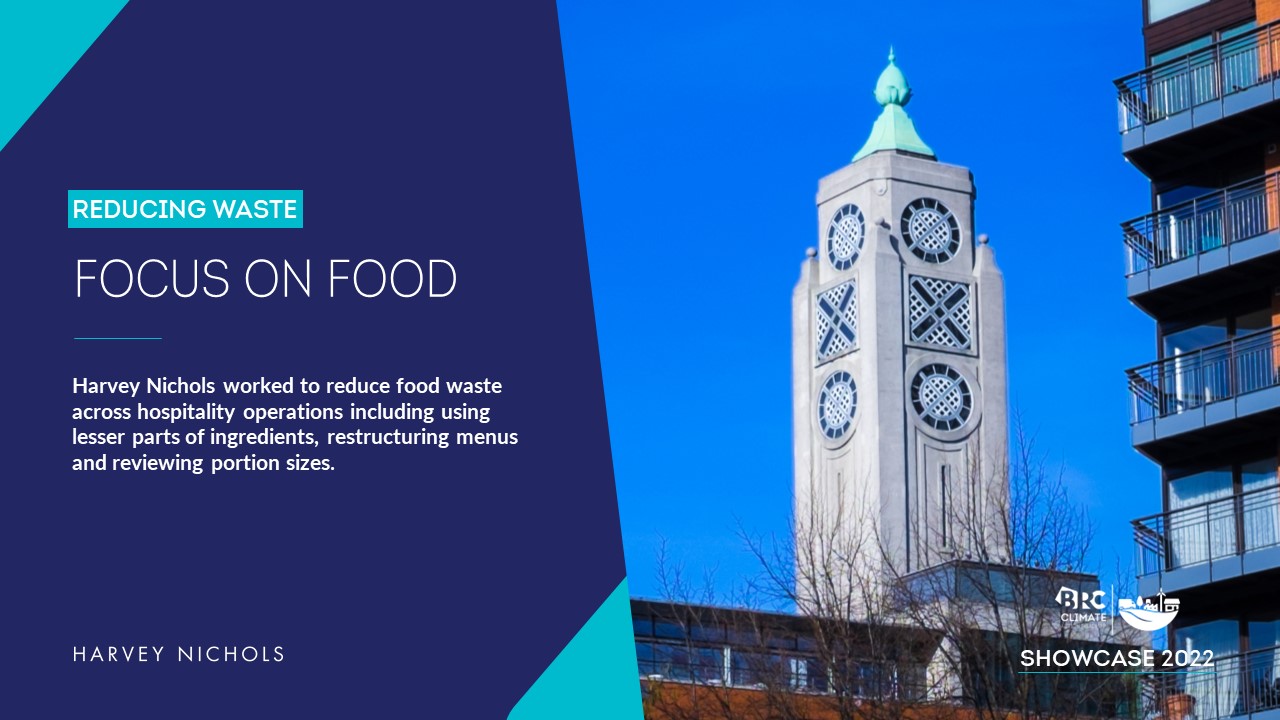
LEARN MORE
Food waste is estimated by the Intergovernmental Panel on Climate Change to contribute 8-10% of total man-made greenhouse gas (GHG) emissions. We, the OXO Tower Restaurant, Bar and Brasserie, are the largest restaurant of the Harvey Nichols hospitality portfolio and therefore were the best option in the business to reduce food waste because we believed our opportunity for impact and learning would be greatest here.
Food waste reduction starts with assessing the extent of the issue, so the restaurant team started measuring food waste in 2019 with the support of the Sustainable Restaurant Association. This allowed us to set a food waste benchmark and agree on a specific goal. A 7% reduction target for 2030 was set, a plan of action developed, and progress monitored from 2020.
Over the last 2.5 years we have evolved the way we operate in a number of different areas, including: menu structure, reviewing portion sizes, implementing lesser used parts of ingredients into dishes, training the front and back of house team, sharing our learnings with customers and our partners as well as working with new partners to redistribute and redirect surplus food.
We are proud to report that at our last measurement we had achieved a 50% reduction against the 2019 benchmark. Additionally, through our food redistribution and community partnerships created in 2020, we redistributed 1.2 tonnes of surplus food by producing over 6,900 meals for vulnerable people in London in 2021. This in turn, helped others reduce their food waste.
John Lewis Partnership – Making mattresses out of excess wool
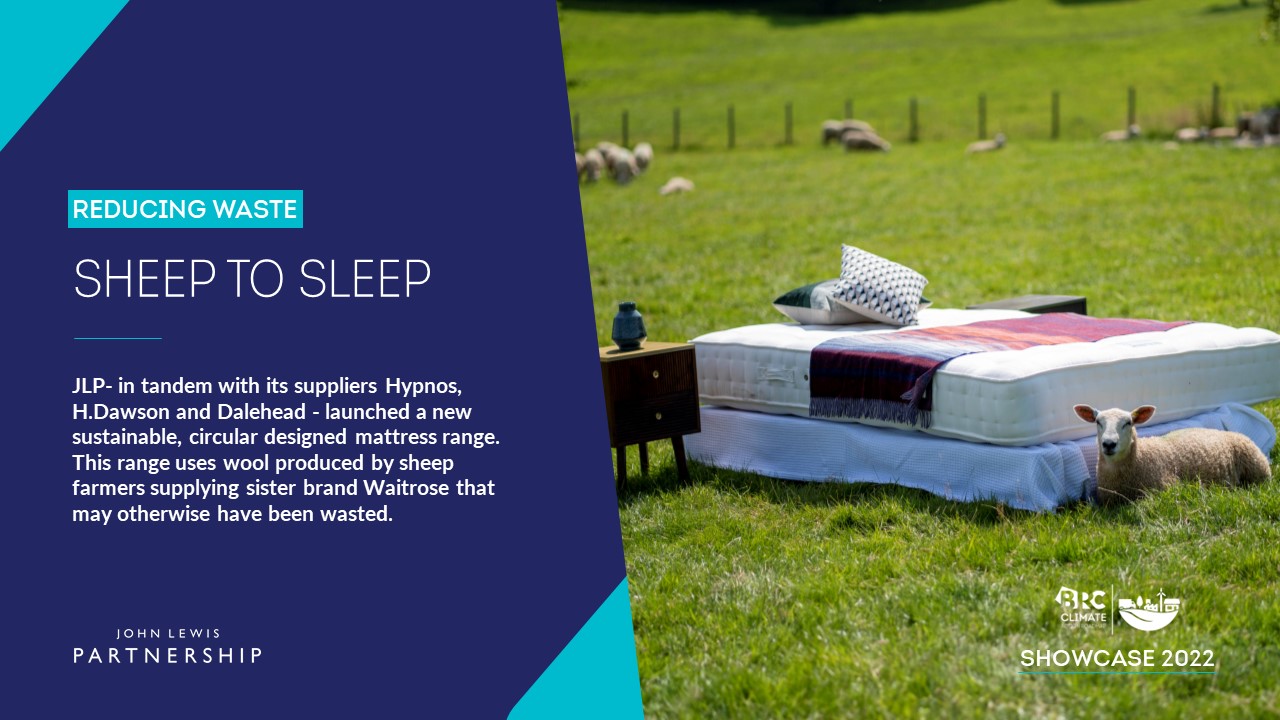
LEARN MORE
The price offered to farmers for their wool has been driven to such low levels, many are forced to burn it - which hits them hard financially and negatively impacts the environment, too.
To help, the John Lewis Partnership - in tandem with its suppliers Hypnos, H.Dawson and Dalehead - launched a new sustainable, circular designed mattress range in August 2021. This range exclusively uses wool produced by sheep farmers supplying sister brand Waitrose that may otherwise have been wasted.
This has not only added value to Waitrose’s farmers but helped raise awareness of a really important agricultural/ environmental issue.